 آھنگے ءِ واھند اَت ۔ اُستاد غلام رسول دینارزئی ءِ پت ءِ نام لال محمد اَت ۔ آئی ءِ پیرین چَہ روایرشتی بلوچستان ءِ ھند بنپور ءِ دمگاں کساس1860م ءَ چَہ گجرانی (قاجاری ) اُرش ءُ ھاکمانی زپت ءُ زورءَ وتی ھنکین ءَ درکپتگ ءُ چَہ گوادر ءِ راہ ءَ کراچی ءَ شتگ ءُ سربوتگ اَنت ۔ کراچی ءَ سالار کمپان ءَ بہ نند جاھی بوتگ اَنت ۔ چیزے سال ءَ پد چَہ اُود ءَ درکپتگءُ گل محمد لین لیاری ءَ اُرد اِش کرتگ ۔ مدتے ءَ رند چَہ اُود ءَ ھم لڈ ءُ بار کرتگ ءُ ریکسر ءَ ھنکین اِش کرتگ ۔ اُستاد دینارزئی 1943عیسائی ءَ ھمے میتگ [ ریکسر کراچی ] ءَ ودی بوتگ ۔ چیزے کلا س ھمد ءَ وانگ ءَ پد گل محمد لین لیاری اسکول ءَ داں میڈل ءَ در ئِے برتگ ( بزاں 8کلا س ونتگ ) پد ءَ وانگ یلہ کرتگ ءُ کیاماڑی ءَ مزوری ءَ گلائش بوتگ ۔ بیست ءُ پنچ سالگی عمر ءَ اُستاد فتح محمد نسکنتی ءِ سوجکاری ءَ ھِندی کلاسیکل زیمر ءِ دربرگ ءُ ھیل کاری بنا ئِے کرتگ ۔ چیزے سال ءِ ھیل زیری ءَ پد وت بلوچی شعرانی سر ءَ ( چوکہ احمد جگر ۔ جی آر ملا ۔ احمد زھیر ءُ دگہ )ترز دیگ ءِ کار ئِے دست ءَ زرتگ ۔ آئی ءِ اولی ترز احمد جگر ءِ شعر(بیا بیا ترارا اَے جان دل ءَ دار آں ) گوں بلوچی ءِ وشیں زیمرے ءَ مھلوک ءِ دیم ءَ اَتکگ ءُ سک نامدار بوتگ ۔ آئی ءَ پد دینارزئی ءَ ترزسازی ءُ زیمرساچی ءِ میدان ءَ بے مٹ ءُ بے دروریں پیمے ءَ وتی کار برجاہ داشتگ اَنت ۔ 1969ءَ کوئٹہ ریڈیو ءَ بلوچی مراگشاں بھر زرتگ ءُ پاکستان براڈ کاسٹنگ کارپوریشن ءَ بلوچی ءِ بازیں آواز گوں وتی زیمر ساچی ءُ ترز اں ریکارڈ کنائینتگ ۔ چوش کہ محمد جاڑوک ، فقیر ءُ دگہ لھتیں ۔ پد ءَ سال 1975ءَ کراچی ءِ ریڈیو ءَ بلوچی برنامگانی بھر ءَ زیمرساچی ءَ لوٹائینگ بوتگ آ اُود ءَ ھم دینار زئی ءَ مدتے گوں کراچی ءِ بلوچی بھر ءِ ریڈیو ءَ ھمکاری کرتگ ۔ مدتے ءَ رند ریڈیو یلہ کرتگ ءُ کمیں مدتءِ پوریاتگری ءُ مزوری ءَ پد سال 1977ءَ وتی بنکی ملک روایرشتی بلوچستان چابھار ءَ کزک ءِ بندن ءَ رنگ کاری ءِ کار ءَ پہ لاپ کشگ ءَ دزگٹ بوتگ۔ پد ءَ زاھدان ءَ شتگ ءُ ماشینی (ھوٹل ) روگن بھاکنگ ءِ کار ئِے کرتگ ۔ داں کہ ایرانی سال 1385ھ ش ءَ ایران ءُ عراق ءِ جنگ ءِ دوران ءَ ریڈیو زاھدان ءِ بلوچی مراگاھاں پہ کار ءَ لوٹگ بوت ۔ آ اُود ءَ دینارزئی ءَ اھوالکاری ، شنگ کاری ، رجانکاری ، زیمرساچی ءُ گشندھی ءِ پڑ ءِ رندگیری کرتگ ۔ یازدہ سال گوں ایران ریڈیو زاھدان ءِ بلوچی برنامھاں ھمکاری ءُ ھمراھداری ءَ رند ، اَتکگ چابھار ءَ زیمر جاھے پچ کرتگ ۔ اد ءَ وت ءُ تاج
آھنگے ءِ واھند اَت ۔ اُستاد غلام رسول دینارزئی ءِ پت ءِ نام لال محمد اَت ۔ آئی ءِ پیرین چَہ روایرشتی بلوچستان ءِ ھند بنپور ءِ دمگاں کساس1860م ءَ چَہ گجرانی (قاجاری ) اُرش ءُ ھاکمانی زپت ءُ زورءَ وتی ھنکین ءَ درکپتگ ءُ چَہ گوادر ءِ راہ ءَ کراچی ءَ شتگ ءُ سربوتگ اَنت ۔ کراچی ءَ سالار کمپان ءَ بہ نند جاھی بوتگ اَنت ۔ چیزے سال ءَ پد چَہ اُود ءَ درکپتگءُ گل محمد لین لیاری ءَ اُرد اِش کرتگ ۔ مدتے ءَ رند چَہ اُود ءَ ھم لڈ ءُ بار کرتگ ءُ ریکسر ءَ ھنکین اِش کرتگ ۔ اُستاد دینارزئی 1943عیسائی ءَ ھمے میتگ [ ریکسر کراچی ] ءَ ودی بوتگ ۔ چیزے کلا س ھمد ءَ وانگ ءَ پد گل محمد لین لیاری اسکول ءَ داں میڈل ءَ در ئِے برتگ ( بزاں 8کلا س ونتگ ) پد ءَ وانگ یلہ کرتگ ءُ کیاماڑی ءَ مزوری ءَ گلائش بوتگ ۔ بیست ءُ پنچ سالگی عمر ءَ اُستاد فتح محمد نسکنتی ءِ سوجکاری ءَ ھِندی کلاسیکل زیمر ءِ دربرگ ءُ ھیل کاری بنا ئِے کرتگ ۔ چیزے سال ءِ ھیل زیری ءَ پد وت بلوچی شعرانی سر ءَ ( چوکہ احمد جگر ۔ جی آر ملا ۔ احمد زھیر ءُ دگہ )ترز دیگ ءِ کار ئِے دست ءَ زرتگ ۔ آئی ءِ اولی ترز احمد جگر ءِ شعر(بیا بیا ترارا اَے جان دل ءَ دار آں ) گوں بلوچی ءِ وشیں زیمرے ءَ مھلوک ءِ دیم ءَ اَتکگ ءُ سک نامدار بوتگ ۔ آئی ءَ پد دینارزئی ءَ ترزسازی ءُ زیمرساچی ءِ میدان ءَ بے مٹ ءُ بے دروریں پیمے ءَ وتی کار برجاہ داشتگ اَنت ۔ 1969ءَ کوئٹہ ریڈیو ءَ بلوچی مراگشاں بھر زرتگ ءُ پاکستان براڈ کاسٹنگ کارپوریشن ءَ بلوچی ءِ بازیں آواز گوں وتی زیمر ساچی ءُ ترز اں ریکارڈ کنائینتگ ۔ چوش کہ محمد جاڑوک ، فقیر ءُ دگہ لھتیں ۔ پد ءَ سال 1975ءَ کراچی ءِ ریڈیو ءَ بلوچی برنامگانی بھر ءَ زیمرساچی ءَ لوٹائینگ بوتگ آ اُود ءَ ھم دینار زئی ءَ مدتے گوں کراچی ءِ بلوچی بھر ءِ ریڈیو ءَ ھمکاری کرتگ ۔ مدتے ءَ رند ریڈیو یلہ کرتگ ءُ کمیں مدتءِ پوریاتگری ءُ مزوری ءَ پد سال 1977ءَ وتی بنکی ملک روایرشتی بلوچستان چابھار ءَ کزک ءِ بندن ءَ رنگ کاری ءِ کار ءَ پہ لاپ کشگ ءَ دزگٹ بوتگ۔ پد ءَ زاھدان ءَ شتگ ءُ ماشینی (ھوٹل ) روگن بھاکنگ ءِ کار ئِے کرتگ ۔ داں کہ ایرانی سال 1385ھ ش ءَ ایران ءُ عراق ءِ جنگ ءِ دوران ءَ ریڈیو زاھدان ءِ بلوچی مراگاھاں پہ کار ءَ لوٹگ بوت ۔ آ اُود ءَ دینارزئی ءَ اھوالکاری ، شنگ کاری ، رجانکاری ، زیمرساچی ءُ گشندھی ءِ پڑ ءِ رندگیری کرتگ ۔ یازدہ سال گوں ایران ریڈیو زاھدان ءِ بلوچی برنامھاں ھمکاری ءُ ھمراھداری ءَ رند ، اَتکگ چابھار ءَ زیمر جاھے پچ کرتگ ۔ اد ءَ وت ءُ تاج  محمد طاہرءُ دگہ چندے ادبی ، ھنری ، سنگتانی ھمراھی ءَ زیمرءِ ھیلکاری ءَ گلائش بوتگ داں وتی زند ءِ گڈی روچاں ماں چابھار ءَ زیمر ءِ ھیلکاری ءُ ترز سازی ءِ کارءَ دیم ءَ بران اَت ۔ بلوچی ءِ بازیں گوستگیں ءُ نوکین گشنندھاں گوں اُستاد دینارزئی ءِ زیمر ءُ ترزاں نام کش اِتگ ۔ جاڑوک ءَ بہ گرداں نورخان ، عارف ، شاہ جان ،عاصم ، شوکت سفر، شاہ میر سبزل، ءُ دگہ بازینے ءَ وت ءَ گوں دینازئی ءِ ترزاں زیمرینتگ ۔ چَہ دینارزئی ءِ شاگرد ءُ ھیل گروکاں ،محمد علی محمد حسنی کہ انوں وت زیمر ءِ پڑ ءَ مزنیں نامے ءِ ھدا بند اِنت ءُ وشگٹی ءِ پڑ ءَ عبدالباسط چَہ سراوان ءَ ، بابل ھمراز ، وحید اسحاق بلوچ نسب چَہ چابھار ءَ دگہ بازینے اُرد ءُ مزنینے ءَ وت ءَ داں وھدے ءَ گوں نمیرانیں اُستاد غلام رسول دینارزئی ءَ ھمگرنچ کرتگ ۔ اُستاد غلام رسول دینار زئی اے نوبت ءَ بلوچی زبان ءِ چَہ درساں مستریں زیمر زانت ءُ ترزساچ اَت چَہ آئی ءِ بیرانی ءَ پد بلوچی زیمر ءُ زبان یک مزن نامیں زیمر ساچے ءَ زِبھر بوتگ ۔اُستاد غلام رسول دینار زئی ءَ ابید چَہ ترز ساچی ءَ راھگوز ءِ پنام ءَ شعر ھم گوشتگ بلے ھما پڑ کہ آئی ءِ تہ ءَ اُستاد مزن نام ءُ شھزانت اَت آ زیمر اِنت ۔
محمد طاہرءُ دگہ چندے ادبی ، ھنری ، سنگتانی ھمراھی ءَ زیمرءِ ھیلکاری ءَ گلائش بوتگ داں وتی زند ءِ گڈی روچاں ماں چابھار ءَ زیمر ءِ ھیلکاری ءُ ترز سازی ءِ کارءَ دیم ءَ بران اَت ۔ بلوچی ءِ بازیں گوستگیں ءُ نوکین گشنندھاں گوں اُستاد دینارزئی ءِ زیمر ءُ ترزاں نام کش اِتگ ۔ جاڑوک ءَ بہ گرداں نورخان ، عارف ، شاہ جان ،عاصم ، شوکت سفر، شاہ میر سبزل، ءُ دگہ بازینے ءَ وت ءَ گوں دینازئی ءِ ترزاں زیمرینتگ ۔ چَہ دینارزئی ءِ شاگرد ءُ ھیل گروکاں ،محمد علی محمد حسنی کہ انوں وت زیمر ءِ پڑ ءَ مزنیں نامے ءِ ھدا بند اِنت ءُ وشگٹی ءِ پڑ ءَ عبدالباسط چَہ سراوان ءَ ، بابل ھمراز ، وحید اسحاق بلوچ نسب چَہ چابھار ءَ دگہ بازینے اُرد ءُ مزنینے ءَ وت ءَ داں وھدے ءَ گوں نمیرانیں اُستاد غلام رسول دینارزئی ءَ ھمگرنچ کرتگ ۔ اُستاد غلام رسول دینار زئی اے نوبت ءَ بلوچی زبان ءِ چَہ درساں مستریں زیمر زانت ءُ ترزساچ اَت چَہ آئی ءِ بیرانی ءَ پد بلوچی زیمر ءُ زبان یک مزن نامیں زیمر ساچے ءَ زِبھر بوتگ ۔اُستاد غلام رسول دینار زئی ءَ ابید چَہ ترز ساچی ءَ راھگوز ءِ پنام ءَ شعر ھم گوشتگ بلے ھما پڑ کہ آئی ءِ تہ ءَ اُستاد مزن نام ءُ شھزانت اَت آ زیمر اِنت ۔

















